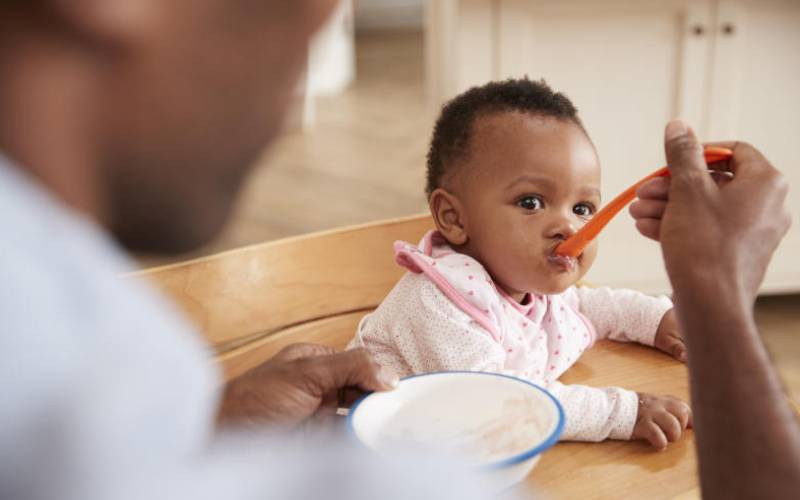Why you should get your baby out of your bed
Many parents will confess that they receive a guest or two in their beds every night, but they are in limbo over whether the visitor — their dear child —is welcome or unwanted. GARDY CHACHA talks to mothers and experts about why parents should send their children away without guilt.
For parents, the shrill of a toddler demanding access to her mother’s bosom for some liquid gold (in the name of breast milk) is quite familiar. They will wiggle, coo, wail and throw tantrums until they have their way.
Don’t fall for it. Wandia Maina advises: “Children will want anything and everything under the sun. That does not necessarily mean that it is good for them.”
Wandia, a counselling psychologist in Kilimani, says that parents ought to start weaning their babies off the bedroom early; precisely at six months. As they grow, she says, they learn that mom and dad need their space when dusk strikes.
But that has not been quite the case if our observations from random interviews are reliable. Parenthood, admits Ann Mbugua, is not perfect black and white. She says ‘perfect parents’ don’t exist and most advice for parents struggling to get their children out of their beds can seem like solutions for perfect parents. Ann is among many women who know the price paid when babies cling onto their mothers’ beds and conventional advice doesn’t seem to work.
She says: “My body was never ready for anything. I would reach home exhausted after work. It didn’t help matters that when the children needed my attention; when they wanted to breastfeed; when they wanted to play with their mother, I was too tired.”
Ann’s lamentations are born of the fact that night-time duties that her babies subjected her to, due to the closeness she had created, deprived her of precious sleep. Putting the baby on his/her own bed didn’t quite work. Their cries would break her heart and Ann would find her way over to either take them back or cuddle up in their bed.
“I would feel guilty every time I denied them a night in my bed. Trying to get them out was not easy,” says Ann. But when she began tucking her first born in her own bed, the baby was just a year and a half. Success came almost a year later – after many nights of tantrums.
According to Lucy Muchiri, the senior midwife and Director at Eve’s Mama Midwife Clinic and Birth Centre in Nairobi, babies refusing to leave their parents’ bed could have a lot to do with the extent of attachment created.
“Don’t start what you cannot sustain,” she says. “A baby is capable of sleeping on their own from day one. The earlier they learn the boundaries the easier it will be for both mother and child. Otherwise mothers stand the risk of daytime lethargy having been awoken many times by the baby throughout the night.”
Convenience
Many middle-class women, says Lucy, pull the baby’s cot close to their bed for the reason that moving the baby over into the main bed would be easier. The plan, she suspects, is to tug them from arm’s length and shove the breast into their mouth to shut them up as soon as possible.
“This is laziness, which does not solve the problem. Instead, it creates another problem; the baby is not well fed,” argues Lucy, adding, “The breast becomes a tool to silence the baby. Ideally, the baby should be fed at intervals. Putting them next to the breast throughout the night is not the way to go about it.”
As Anne would put it, success getting the baby out of the bed doesn’t come easy. There are plenty of disturbed nights; which then translate to perpetual exhaustion. Maureen Amakabane would discover the hard way.
Just four months after the birth of her daughter, she achieved what many mothers struggle with for years. Her baby had found and clung to the rhythm of sleeping throughout the night – in her own cot no less.
“From the time she was born, she never spent a night on my bed. By four months, she went full nights in her own cot without causing much trouble,” Maureen says.
The experience brought tranquillity in the house, much to Maureen’s comfort. All was well until one cold July when she thought it wise to transfer the baby to her bed, fearing that her daughter would suffer from the effects of low temperatures.
“Little did I know that I had disturbed the peaceful nights. She was eight months when I brought her to bed and now, at 15 months, she is yet to fancy nights in her own cot. I have now found myself struggling with attachment because she will yell until she is with me on the bed,” laments Maureen.
Known as co-sleeping in developed cultures, professionals now believe that spending nights with your baby in the bed may be costly and bring no extra benefit compared to giving them independence at the earliest opportune time.
Bernadette Muendo, a midwife at Syumile Health Centre in Makindu, says that unless a baby is underweight at the time of birth, it is not mandatory that they spend nights close to their mother.
Dangerous move
“Kangaroo mother care is practiced when the baby, even at full term, weighs lower than what is considered normal. This is among the unique situations a mother will be forced to keep the baby at skin distance. A baby within the right weight ranges can spend nights in their own cot or bed even from the first day,” says Bernadette.
She adds that babies too, need their space. But most importantly, keeping the baby in his own cot may save the parents a catastrophe. It is a sentiment that Lucy preaches to the mothers she attends to both as a midwife nurse and doula – the latter being a woman who cares for pregnant mothers.
“There is risk of smashing the baby; or suffocating the baby while parents are deep asleep,” says Lucy. On her part, Bernadette says, “Such an accident may seem far-fetched until a mother wakes up to her baby’s lifeless body. Prolonged pressure on the baby may block the chest from breathing. The same may happen through an accidental covering of the baby under thick blankets.”
Ann began introducing hers to her own bed at one year. However, in hindsight, if she was to relieve all the experiences of motherhood, “I would probably start much earlier.”
Working as a marketing consultant means that Maureen has to be on time for meetings and scheduled appointments. And though she does her best to wade through work and motherhood, she is sure peaceful nights – like the ones she was used to when her daughter slept through the night – would have been good for her productivity and vigor at work.
The push-and-tag with a baby wears out a mother, says Lucy. The best way, adds Wandia, would be for the mother to develop resistance to the baby’s tantrums wanting to return back into the bed. “Tune your mind to reject their wishes; you have to practice tough love so that the baby eventually learns where they ought to spend the night,” says the psychologist.
Protect your baby from early sex exposure
As early as six months, children begin noticing what happens in their environment. According to Wandia, what may seem harmless behaviour, "such as undressing or dressing before the child may have an effect in what they grow up to believe about human sexuality."
Keeping the baby in the bedroom wouldn't exactly stop couples from intimacy. Tom Lichuma, a father of six, notes that when babies reach an age when they seem curious about what happens between their parents, it behoves immediate action.
"At this point, the baby should be put in the cot throughout the night," he says. "The main bed then remains for parents only."
Tom's wife, Linet, with whom he has co-authored a book, "Parenting in the 21st Century and Beyond" says that how parents manage to control their bedroom matters may not be a one-size-fits-all formula.
"Other factors like the economic status of the family play out," she says, "because if both parents and children have to do with a one-roomed house, then the dynamics are somewhat different."
But while parents may have to do with sharing a room with the children, Linet says it is still prudent to keep a good amount of distance between them and babies (or children) who are old enough to be curious on matters of sex.
"By one year," says Tom, "a baby can follow the happenings around him. Nakedness before them or sexual activity should then move into safe space. It would not be proper to expose children to acts too complicated for their interpretation."
On the flip side, parents too, need to keep up a healthy sex life. Ann admits that intimacy "was kind of hard since I feared the baby would wake up." The months she shared a bed with her daughter were filled with trepidation; constantly worried about 'getting caught'.
"Frankly, it diminishes the spark of intimacy," she says.
But if the decision was left for Lucy, she would have three other reasons apart from early sex exposure why the baby would never set foot in the bed. "One, from conception the baby has never been alone and when it is born, it means that is its time to gain that independence," she say,
"Then there is the baby's safety against infant death syndrome. The baby is safe on his own cot. It has also been observed that babies sleep better when they are alone. A mother's body movements and the smell of breast milk are likely to keep interfere with their sleep."
 The Standard Group Plc is a multi-media organization with investments in media platforms spanning newspaper print
operations, television, radio broadcasting, digital and online services. The Standard Group is recognized as a
leading multi-media house in Kenya with a key influence in matters of national and international interest.
The Standard Group Plc is a multi-media organization with investments in media platforms spanning newspaper print
operations, television, radio broadcasting, digital and online services. The Standard Group is recognized as a
leading multi-media house in Kenya with a key influence in matters of national and international interest.




